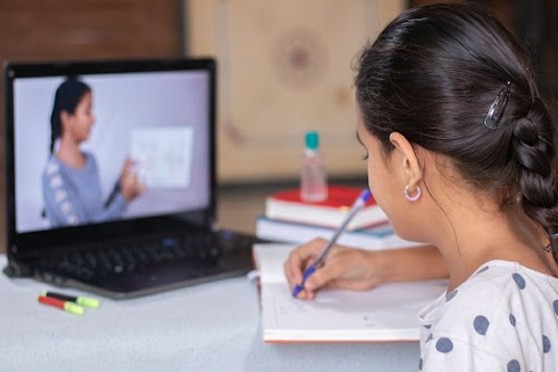Schools have resumed in-person classes but certain activities will continue online because of the advantages they offer, several school heads said.
The Telegraph lists a few such things
Lectures and projects
Classrooms will be for lectures, while students will keep getting online links and power-point presentations on the relevant chapters before and after class, principals said.
“A sudden school closure because of bandh or incessant rain can be compensated with online classes,” said Seema Sapru, principal of The Heritage School.
“We have understood there has to be a blend of online and in-person classes. If there is a sudden unannounced off, we will carry on with online classes.”
Teachers feel an online platform will keep parents updated with what a teacher is doing in class. “We will continue to send resource materials online and children and parents will have a back-up of the academic content,” said Nupur Ghosh, vice-principal of Mahadevi Birla World Academy.
“Students can submit projects online and for remedials, they need not stay back in school,” said Sharmila Bose, director of Sushila Birla Girls’ School. “We cannot let the online skills fade out.”
Online meetings
Parents need not have to wait in a queue to meet teachers and be late for work — some schools will continue with online parent-teacher meetings.
“It will enable parents to attend a meeting even when they are travelling,” said Devi Kar, director of Modern High School for Girls.
Teachers, too, will benefit from online meetings. “Teachers can call a meeting with students in the evening or any other suitable time if they have to discuss a certain programme or event,” said Kar.
Device freedom
Confiscation of phones could become a thing of the past, especially in senior classes, because students now use such devices to make presentations or take down notes, a school head said.
“There is so much that can be done that possibly teachers would also want students to use a gadget. As a school, we would have to be more vigilant and block various sites,” said Meena Kak, director, Lakshmipat Singhania Academy.
“Students are used to a device and the skill is at their fingertips. Devices will find their way into classrooms but we will have to have stricter protocols” Bose said.
Virtual fests
Several schools will explore the option of “inviting guests online”. Even for fests held online, one could invite guests or participants from other countries.
“We have international collaborations and our students will continue to engage with students from other countries online. After the pandemic, we cannot have mundane teaching-learning in classrooms. It has to be innovative and interactive pedagogy that will excite the students,” said Janet Gasper Chowdhury, president of St Augustine’s Education Society that runs St Augustine's Day School in Barrackpore and Shyamnagar.
Schools will also save on expense and time by holding events online.
“We won’t have to incur the expense of bringing a guest to the campus if the programme is held online,” said a school head.
“We will keep having accomplished men and women speak to our students. Despite the time difference, they can make adjustments to their schedule to speak for an hour or so,” said Madhumita Seal, vice-principal, BDM International.
Communication
School notices will continue to be sent online through social media groups or parents' apps.
“We can save reams of paper if notices are sent online. Communication with parents has become more direct,” said Amita Prasad, director of Indus Valley World School.
Madhyamik begins tomorrow
As many as 11,26,863 candidates will write Madhyamik, which starts on Monday.
More than 47,000 students are appearing in the exams this year compared with last year’s enrollment. The exam could not be held last year because of Covid.
The on-campus tests will be held from March 7 to 16.
Among the examinees, 6,26,804 are girl students, secondary education board president Kalyanmoy Ganguli said.
“The exam will be held at 4,194 centres. In 2020, there were 2,838 centres,” Ganguly said.
The number of centres has been increased so the examinees could maintain distance from each other, as a precaution against Covid.
Each centre will have an isolation room where examinees with Covid-related symptoms can write the papers.
Our special correspondent
